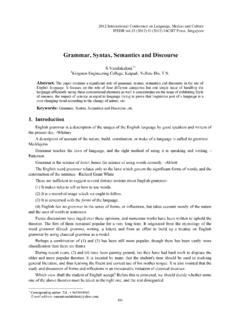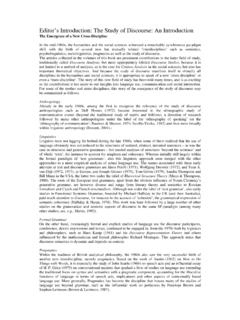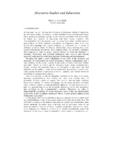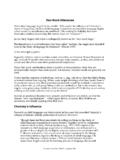Transcription of DIFFERENCES IN THE SPEECH OF MEN AND WOMEN.
1 Z rcher Hochschule Winterthur Departement Angewandte Linguistik und Kulturwissenschaften Institut f r bersetzen und Dolmetschen Studiengang bersetzen Diplomarbeit Franziska Voegeli DIFFERENCES IN THE SPEECH OF MEN AND WOMEN. LINGUISTIC CONSTRUCTION AND PERFORMANCE OF GENDER: THE GERMAN SUBTITLING OF GENDER-SPECIFIC ENGLISH IN THE DOCUMENTARY VENUS BOYZ Theoriearbeit Referent: Dr. Gary Massey 31. August 2005 iiABSTRACT Gender linguistics studies the way men and women speak or are spoken about. Because of its derivation from general linguistic gender conventions, the SPEECH of the homosexual community has often been the subject of (socio-)linguistic study. Transvestites, and in particular drag kings and queens, can be considered part of that community. When constructing and performing their gender and sexual identity, they draw on the conventions of the linguistic behavior of men and women in their society.
2 The SPEECH of four protagonists from the documentary Venus Boyz is analyzed in terms of the gender identity created and performed through language on the basis of conventional male and female language features established in previous research. Such features are then tested for their validity and relevance in gender construction and performance. The analysis is conducted on oral English source-language texts and also covers their translation into German subtitles in order to explore the translatability of gendered language in this language pair under the formal constraints of the genre. iiiCONTENTS ABSTRACT ..ii CONTENTS ..iii 1 INTRODUCTION ..1 2 BACKGROUND ..4 (Fe)male SPEECH Features ..5 Three Ways of Interpreting the DIFFERENCES ..7 Revealing Gender: A Brief Case Study ..10 Reversed Roles.
3 12 Drag ..13 Camp ..15 History of Camp ..17 Performing Gender ..18 Universal (Western) Gender? ..19 3 DATA & METHOD ..21 Data ..21 Method ..23 Note on the Subtitling and Translation of Gendered Language ..25 4 RESULTS ..28 Anonymous ..28 Shelly Mars Damian Corson ..30 Zanthony Preston Queen Bee Luscious ..32 Mildred G restant Dr d G restant ..36 5 DISCUSSION ..45 6 ivREFERENCES ..51 APPENDIX 11 INTRODUCTION Gender linguistics is concerned with various aspects of the representation of gender in language. They can be divided into two categories: How the genders speak (or write), and how they are spoken (or written) about. Karin M. Eichhoff-Cyrus, editor of a volume on gender linguistics published by DUDEN, expresses the importance of the subject as follows: [.]
4 ] Sprache spiegelt nicht nur Realit t, sie schafft auch Realit t (Eichhoff-Cyrus, 2004: 7): Language not only reflects reality, it also creates reality. This dissertation will deal with how the genders express themselves in spoken language. How the genders are spoken (or written) about usually involves a feminist agenda and applies to women s representation in language, which has become an important political issue. To be politically correct, the once sex-indefinite pronoun he is being substituted with he or she (Bondine, 1990), and gender-specific nouns for professions are created or reinforced (for example, actor/actress). The representation of the genders in fiction also falls into the category of how the genders are represented in language. Considering how the genders express themselves, Dale Spender addresses the issue of men being the ones who have made the world which women must inhabit (Spender, 1990: 93).
5 This created world refers to the world of words, the world as it was named with language, and thus the instrument determining the limits of our world, which constructs our reality (Spender, 1980: 94). Such restrictive language forces women into a system of personal expression that is not necessarily true to their nature, something that has been addressed not only by linguists, but, for example, as early as the first half of the 20th century by the writer Virginia Woolf in Women and Fiction (Woolf, 1990: 47-53) or in The Angel in the House (Woolf, 2004: 185-190). In these articles, Woolf addresses the struggle women writers experience because they are limited by the conventions of writing that have been created by minds of men. In the first instance, this is the very form of the sentence [that] does not fit her.
6 It is a sentence made by men; it is too loose, too heavy, too pompous for a woman s use (Woolf, 1990: 50); but Woolf also felt restricted in her writing by what she called ghosts or phantoms (Woolf, 1942: 189), which were what she felt to be controlling instance in her own head that would judge her own writing by male standards (Woolf, 1942: 187-189). She felt that to write freely and according to their female nature, women would have to learn to break out of the role society expected of them. To a similar degree, gender issues are confronted with the problem of existing gender stereotypes and 2clich s in society. Hence, a society s ideology of gender may stand as the common denominator connecting the various issues. However, this dissertation will not address any specific agenda, political or otherwise.
7 Neither the representation of the genders in language nor the expression of the genders in fictional or any other written form are its focal point. The only exception will be the example of an e-mail interaction, analyzed because that particular piece of text is not constrained by the formality or norms of writing but is comparable to spoken discourse. Instead, this undergraduate dissertation is concerned with one aspect of gender linguistics: The verbal behavior of men and women, a field of study of inherited and learned language patterns in human minds. Noam Chomsky assumes that all people have a basic sense of language, or rather of grammar, in them: Generative grammar (Chomsky: 1966). Is it possible that we also have a pattern of language usage engraved in us, depending on whether we are male or female?
8 This dissertation considers in particular the oral expression of the genders. How do the genders talk and how do people create and perform gender with language? When men and women talk, their utterances differ in terms of semantics, syntax, and implicatures. It is possible that the DIFFERENCES in SPEECH behavior are perceived to be much stronger than they actually are. Therefore, alongside natural gender DIFFERENCES in SPEECH , stereotypes also serve to create and perform gender. After considering gender-based DIFFERENCES in SPEECH in general, this undergraduate dissertation investigates how transvestites (drag kings and queens in particular) make use of those perceived DIFFERENCES to recreate the opposite gender through their SPEECH . Does the use of their language contribute to their credibility as exponents of the other gender?
9 What actual features of language are used because they are specific to one gender or the other, or because they seem to be stereotypically male or female? The data for the analysis of gendered SPEECH in this dissertation is taken from the documentary Venus Boyz (2001). In Venus Boyz, directed by the Swiss filmmaker Gabriel Baur, [w]omen become men- some for a night, others for their whole lives (Baur: ). The selected sequences for analysis do not feature exclusively individuals seeking to perform the opposite gender but also individuals representing a shade of gender other than male or female. This selection was made to investigate how the norms of gender (= man and woman) and also such shades of gender are created and performed. 3 This dissertation also addresses the question of whether gendered language is universal or not. The subjects of study are native English speakers, and most research on gendered linguistic behavior has been formulated for speakers of the English language.
10 For translational purposes, however, it is important to know if gendered SPEECH differs in different languages, and if so, how it operates in other languages. The DVD of the documentary Venus Boyz contains the option for German subtitles. After the linguistic strategies used by the transvestites have been looked at in the original language, the translation of these strategies in the form of the German subtitles is analyzed as well. In this case, not only the transfer of the language, but also transfer of the media from oral text to a condensed version of written text is analyzed for its effect on the outcome of the translation of gendered language. The following chapter will discuss the background to gender linguistics, in particular the research that has been done on the different SPEECH behavior of men and women.






